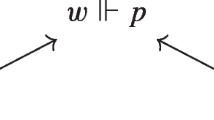Abstract
We introduce a notion of bisimulation for graded modal logic. Using this notion, the model theory of graded modal logic can be developed in a uniform manner. We illustrate this by establishing the finite model property and proving invariance and definability results.
Similar content being viewed by others
References
Van Benthem, J., Exploring Logical Dynamics, Studies in Logic, Language and Information, CSLI Publications, Stanford, 1996.
Cerrato, C., ‘General canonical models for graded normal logics (graded modalities IV)’ Studia Logica 49 (1990), 241-252.
Cerrato, C., ‘Decidability by filtrations for graded normal logics (graded modalities V)’ Studia Logica 53 (1994), 61-74.
Chang, C. C., and H. J. Keisler, Model Theory, North-Holland, Amsterdam, 1973.
De Caro, F., ‘Graded modalities II’ Studia Logica 47 (1988), 1-10.
Donini, F. M., M. Lenzerini, D. Nardi and A. Schaerf, ‘Reasoning in description logics’ in G. Brewka (ed.), Principles of Knowledge Representation, Studies in Logic, Language and Information, CSLI Publications, Stanford, 1996.
Fattorosi-Barnaba, M., and F. De Caro, ‘Graded modalities I’ Studia Logica 44 (1985), 197-221.
Fattorosi-Barnaba, M., and C. Cerrato, ‘Graded modalities III’ Studia Logica 47 (1988), 99-110.
Fine, K., ‘In so many possible worlds’ Notre Dame Journal of Formal Logic 13 (1972), 516-520.
Goble, L. F., ‘Grades of modality’ Logique et Analyse 13 (1970), 323-334.
Van Der Hoek, W., Modalities for Reasoning about Knowledge and Quantities, Phd thesis, Free University of Amsterdam, 1992.
Van Der Hoek, W., ‘On the semantics of graded modalities’ Journal of Applied Non-Classical Logic 2 (1992), 81-123.
Van Der Hoek, W., and M. De Rijke, ‘Generalized quantifiers and modal logic’ Journal of Logic, Language and Information 2 (1993), 19-57.
Van Der Hoek, W., and M. De Rijke, ‘Counting objects’ Journal of Logic and Computation 5 (1995), 325-345.
Kurtonina, N., and M. De Rijke, ‘Bisimulations for temporal logic’ Journal of Logic, Language and Information 6 (1997), 403-425.
Kurtonina, N., and M. De Rijke, ‘Simulating without negation’ Journal of Logic and Computation 7 (1997), 503-524.
Marx, M., Algebraic Relativization and Arrow Logic, PhD thesis, ILLC, University of Amsterdam, 1995.
Nakamura, A., ‘On a logic based on graded modalities’ IECE Trans. Inf. & Syst., E76-D(5) (1992), 527-532.
De Rijke, M., ‘Modal model theory’ Annals of Pure and Applied Logic (to appear).
Schlingloff, H., ‘Expressive completeness of temporal logic of trees’ Journal of Applied Non-Classical Logics 2 (1992), 157-180.
Rights and permissions
About this article
Cite this article
de Rijke, M. A Note on Graded Modal Logic. Studia Logica 64, 271–283 (2000). https://doi.org/10.1023/A:1005245900406
Issue Date:
DOI: https://doi.org/10.1023/A:1005245900406




